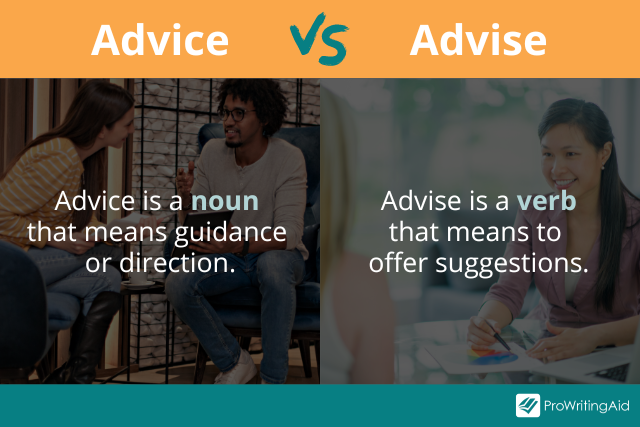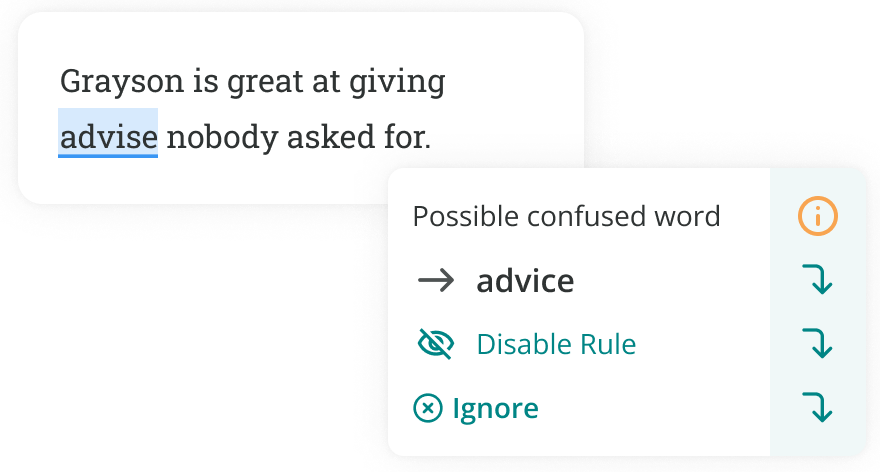
The English language can be confusing. There are many words that can throw you off your grammar game because of a single letter.
Advise and advice are two commonly confused words. After all, the only difference between these two words is the S and C.
These two words are typically used within the same context—that is, relating to offering a suggestion or opinion—but they’re pronounced differently and have different meanings.
So what exactly is the difference?
Advice is a noun that means “an opinion or suggestion,” while advise is a verb that means “to offer suggestions.”
This article will explain the difference between advice vs advise in more detail.
Advice vs Advise Definition
Advice is a noun that means “an opinion recommended or offered.”
Advise is a verb that means “to offer suggestions about the best course of action.”
Advice vs Advise Meaning
Advice is a thing that you can give and receive. Whenever you’re in trouble and need help, advice is what you seek out. Common synonyms for advice include guidance and direction.
For example, you might say, “Follow the doctor’s advice.” This sentence means the same thing as, “Follow the doctor’s direction.”

In contrast, we use the verb advise to describe the act of offering suggestions. Common synonyms for advise include suggest and recommend.
For example, you might say, “I’ll advise you on what to do.” This sentence means the same thing as, “I’ll recommend a course of action to you.”
The Difference Between Advice and Advise
Advise is the act that is carried out—it is being performed by someone—while advice is a thing that is being given. The first is a verb, and the second is a noun.
When to Use Advice and Advise
The easiest way to remember when to use advice or advise is to think about parts of speech. Are you looking for a verb, which a person can perform, or a noun, which a person can give or receive?
As long as you remember that advice is a noun and advise is a verb, you’ll be able to fit them into a sentence correctly.
Another way to remember the difference is to think about synonyms. If you could switch the word out with the verb suggest (which starts with S), you should use advise with an S.
If you could switch the word out with the noun guidance (which has a C), you should use advice with a C.
If you still need a little help, ProWritingAid will highlight any confused words in your writing and help you fix them with one click.

Examples of Advice vs Advise Used in Sentences
Now that you have the basics, let’s look at some examples of advice in a sentence.
- The principal ominously mentioned that we should heed his advice.
- I trust your advice more than anyone else’s.
- Her father gave them sound financial advice.
- You should take their advice with a pinch of salt.
- She bragged that her mother’s advice had never failed her.
- Thank you for your advice.
In contrast, here are some examples of advise in a sentence.
- I have to go to court, and I need you to advise me in this matter.
- Please advise me on what to do when filling in this application.
- The teacher will advise the students of the risks before going on the field trip.
- I advise you to leave this place before you cause any more trouble.
- She had to advise the new employees on the workplace safety procedures.
What About Adviced or Advised?
The ending -ed can be used to conjugate a verb to the past tense. You should only use this conjugation with verbs, not nouns.
Advise is a verb, while advice is a noun. Therefore, the correct word is advised, which is the past tense form of advise, not adviced, which is not a real word.
What About Advicing vs Advising?
Like -ed, -ing is also a verb ending, which you should only use with verbs, not nouns. Advising is the present participle conjugation of advise, while advicing is not a real word.
In general, just remember that advice is a noun and advise is a verb, and you’ll be good to go!


